2023 IN REVIEW


Trust Director: Jessica Mannix
Programme Director: Dr Claire Cockcroft
Editors: Jessica Mannix, Lizzie Emerson, Matt Phipps
Design: Laura Hart
Contact: jessica.mannix@some.ox.ac.uk



Trust Director: Jessica Mannix
Programme Director: Dr Claire Cockcroft
Editors: Jessica Mannix, Lizzie Emerson, Matt Phipps
Design: Laura Hart
Contact: jessica.mannix@some.ox.ac.uk
The Rt Hon. the Baroness Royall of Blaisdon Principal, Somerville College Chair of Trustees
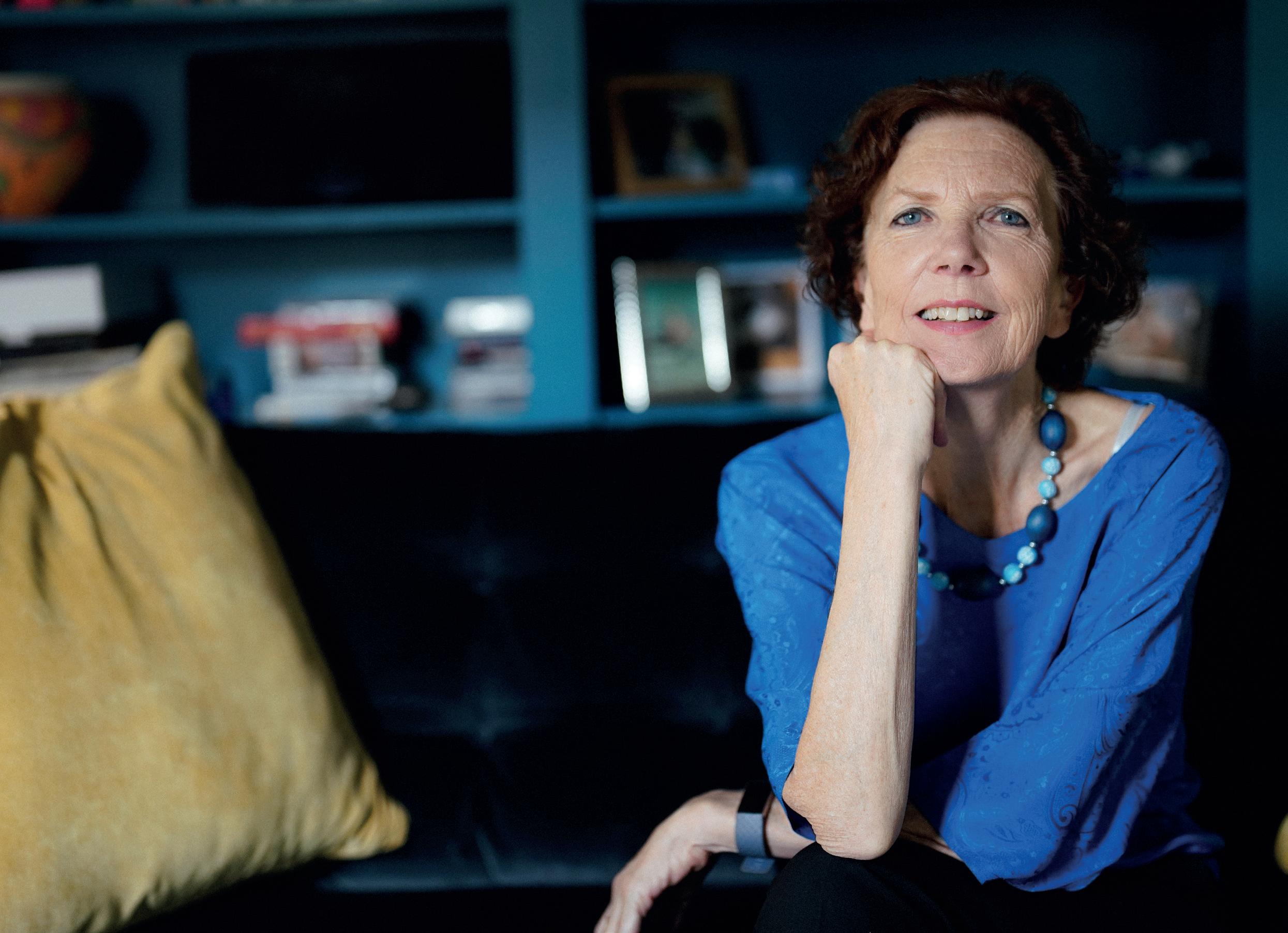
When my predecessor, Dr Alice Prochaska, first dreamed of creating a scholarship programme in the name of one of the College’s most eminent alumnae, she surely could not have imagined how quickly it would become established as one of the leading scholarship programmes in Oxford.
2023 saw two milestones reached by the Margaret Thatcher Scholarship Trust: the 10th anniversary of its foundation and the awarding of the 50th Thatcher Scholarship. We have only been able to achieve this through the dedicated support of our donors, patrons, trustees, and supporters. To you all, I say a huge ‘Thank you’. Thank you on behalf of Somerville, which has benefitted from having these extraordinary young people as part of our community. Thank you also on behalf of the scholars themselves whose lives are transformed by the Thatcher Scholarship – by freedom from financial worries, and by the doors these scholarships open for them.
Anniversaries like this also allow us to review and to ensure that the vision upon which the Thatcher Scholarship Programme was established remains at the heart of everything we do. When we set out on this journey 10 years ago, we pictured a body
of scholars that would reach into courtrooms, boardrooms, newsrooms, hospitals, NGOs, schools, universities and governments around the world, forging a better future for their generation and those that follow.
For those who were present to hear our Oxford Qatar Thatcher Scholar alumnus, Mathew Madain, speak at our celebration at the House of Lords last October, the answer to whether we are still on the right track was a resounding ‘Yes’! Among our Thatcher Scholar alumni are doctors, barristers, solicitors, consultants, academics, policy workers, entrepreneurs and those working in finance. I have yet to hear of a journalist, but there is plenty of time yet!
In this current climate of geo-political strife, it is easy to despair. However, we have only to look at what the Thatcher Scholars are doing, both within College and out in the world, in order for hope to return. Through these brilliant young people, the challenges – and opportunities – that the world is facing will be met with confidence, creativity and a determination to succeed.
Onwards to the next 10 years!
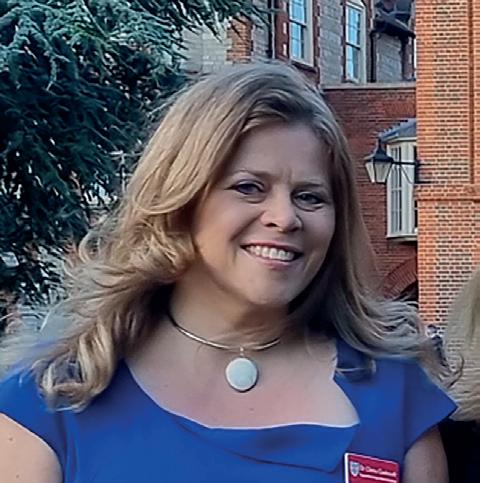
Somerville’s vision “to create a living legacy to one of its most illustrious alumni” has delivered. Today, we see before us a thriving interdisciplinary community of over 50 scholars and alumni from 17 countries across the world, creating a culturally and intellectually diverse network of change-makers.
Our scholars’ academic excellence has been recognised by University prizes. Three undergraduates and two postgraduates achieved firsts or distinctions. Our postgraduate scholars generated publications and conference presentations, and four are now postdoctoral fellows.
Thatcher Scholars are contributing to College and University life, as society presidents, outreach volunteers, in sports and organising seminars. Their endeavours are supported by alumni scholars, many of whom engage with the Skills Hub to share careers insights. Luca Webb (2019), is now Head of Communications at SmartParc, an SME ‘reimagining food production for the 21st Century’, in which capacity he arranged three sustainability-focused internships for Somervillians, with more planned for 2024.
The Skills Hub continues to support all students with workshops on academic and transferable skills, careers advice and personal appointments. In a highly popular innovation, we incorporated key academic skills into this year’s Freshers’ Week, and offered a Careers Networking event with alumni for BAME students. Our ‘Reducing digital distraction’ workshops opened the door to an internship for scholar Hannah Andrews,
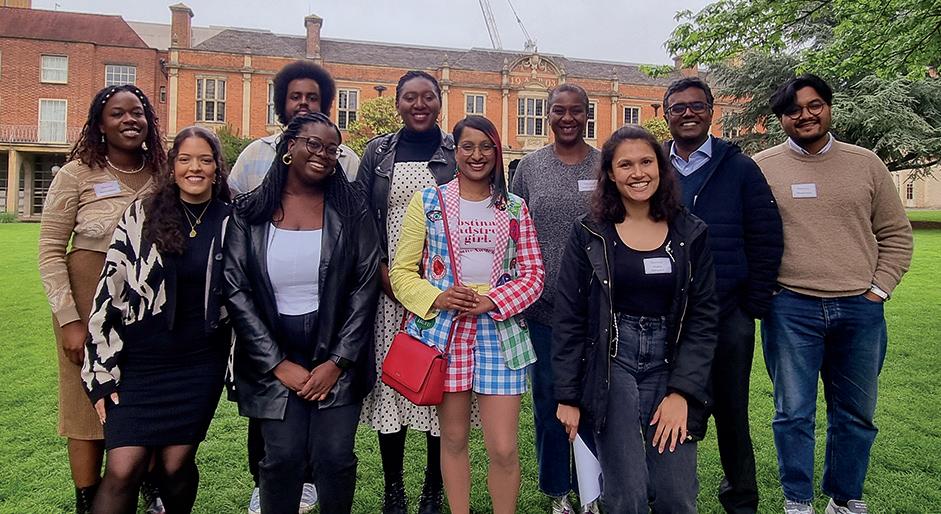
whose work on cultivating digital self-control led to a role running workshops across the UK. With many students daunted at the prospect of public speaking, workshops with RADA tutor and Somerville alumna Alison Skilbeck have proved effective in helping students acquire this key skill.
Eight imaginative projects were funded by Thatcher Development Awards, from voluntary work overseas to marine conservation, Biodesign and Sci-Art communication of issues about climate change and pollution. First year medic Dom Sloper travelled to Nepal to learn about the challenges of public health, disaster-preparedness and high-altitude physiology – skills he hopes to apply in global health and humanitarianism.
Strengthening links with our Junior Research Fellows has generated invaluable internships and collaborations, one funded by a Thatcher Development Award. Communicating Care brought together science, linguistics, movement and poetry to show how clinical practitioners analyse conversations. It was presented at the Oxford Ideas Festival and you can learn more via the QR code.
The ethos of the MTST, “to equip students to go into the world, empowered to make a meaningful difference” is in evidence at every turn, with scholars and alumni at the forefront of renewable energy, international politics, law, cancer therapy and medicine. None of this would be possible without the continued generous support of our many donors and patrons.
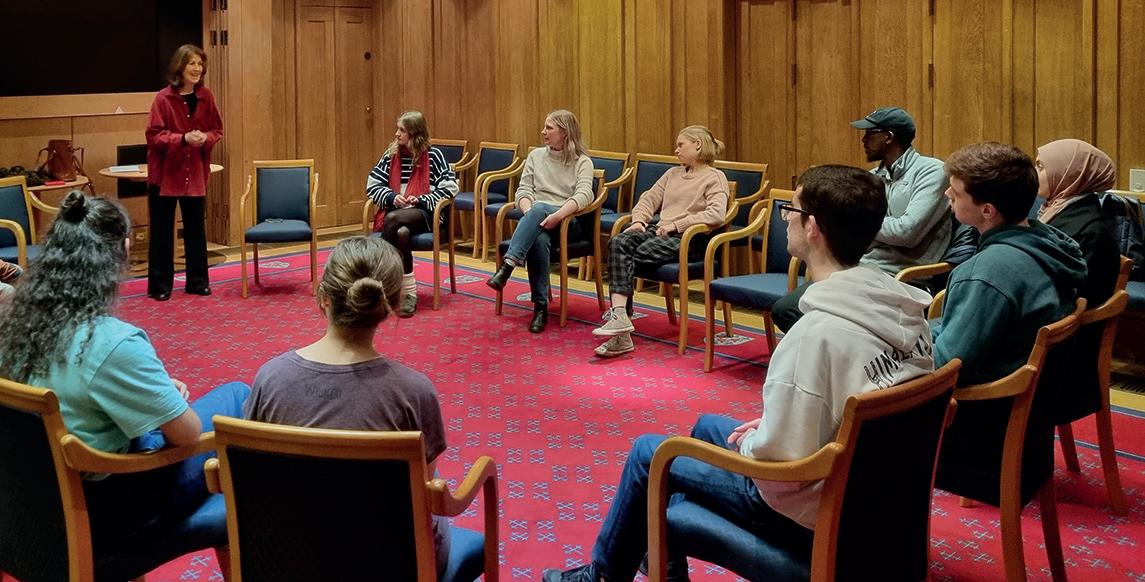
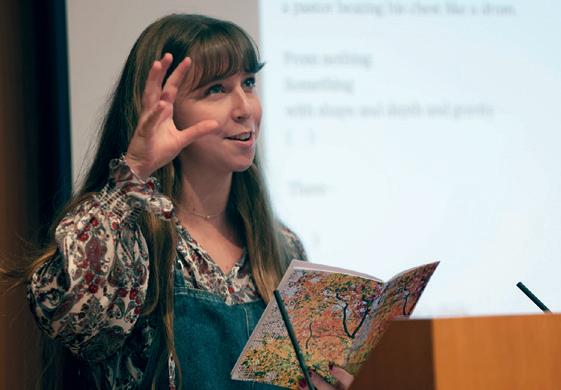

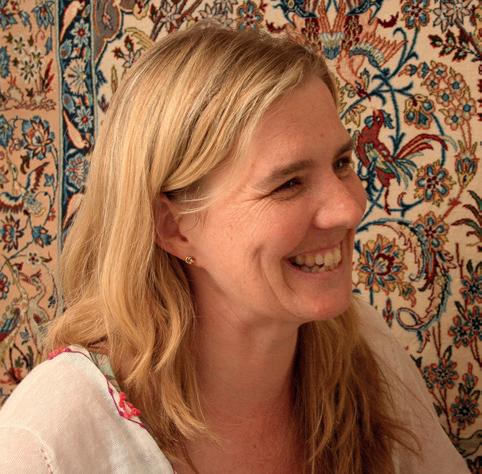
You will have read elsewhere here that we reached two milestones in 2023: 10 years of the Margaret Thatcher Scholarship Trust and the award of the 50th Thatcher Scholarship. While these are worth celebrating, not only in themselves but also because they were reached so quickly, they are simply numbers. The real success and achievement lie in the Thatcher Scholars themselves, in the contributions they make to our community at Somerville and then out in the world.
The Thatcher Scholarship Programme is a human story. It aims to support the brightest minds, releasing them from financial worries so they can benefit from all that Somerville and Oxford have to offer, just as Margaret Thatcher was able to do in 1943. Through the nurturing environment of Somerville and the pioneering Skills Hub, we furnish them with all they need to flourish, and, like a ripple in a pond, the impact they have spreads across the world. You only have to read Mathew Madain’s speech given at our reception in October to see how Alice Prochaska’s vision for the Thatcher Scholars as a force for good is becoming reality.
These achievements would have been impossible without the unflagging support of our donors, patrons, trustees and supporters. I am enormously grateful to our Foundation Fellow, Lord Glendonbrook, who agreed to support an extra scholar in 2023 when the field of candidates was so close that it was impossible to decide between them. In a similar situation, ST Telemedia in Singapore very generously agreed to support another Lee Kuan Yew – Thatcher Scholar. Our partnership with STT has enriched the College community; these scholars are exemplary young men who have thrown themselves into College and University life while excelling in their studies. I look forward to the next phase of
our partnership with STT as they reach their 30th anniversary.
Every year, the field of excellent candidates for Thatcher Scholarships grows and grows, beyond our means to support them. Funding opportunities for postgraduates are few and far between, particularly in the Humanities and Social Sciences. I remember former Vice-Chancellor Professor Andy Hamilton saying that postgraduates are the research engine of a university. They will also be the tutors, lecturers, researchers and professors of the future. While I am very proud that, with the help of the MTST and the Oxford India Centre for Sustainable Development, Somerville is one of the top Oxford colleges for graduate funding opportunities, there is still a huge need for more. Over the next year, therefore, one priority will be to secure further Thatcher Scholarships for postgraduate studies in the Humanities and Social Sciences. I hope to report in the next Bulletin that I have been successful!
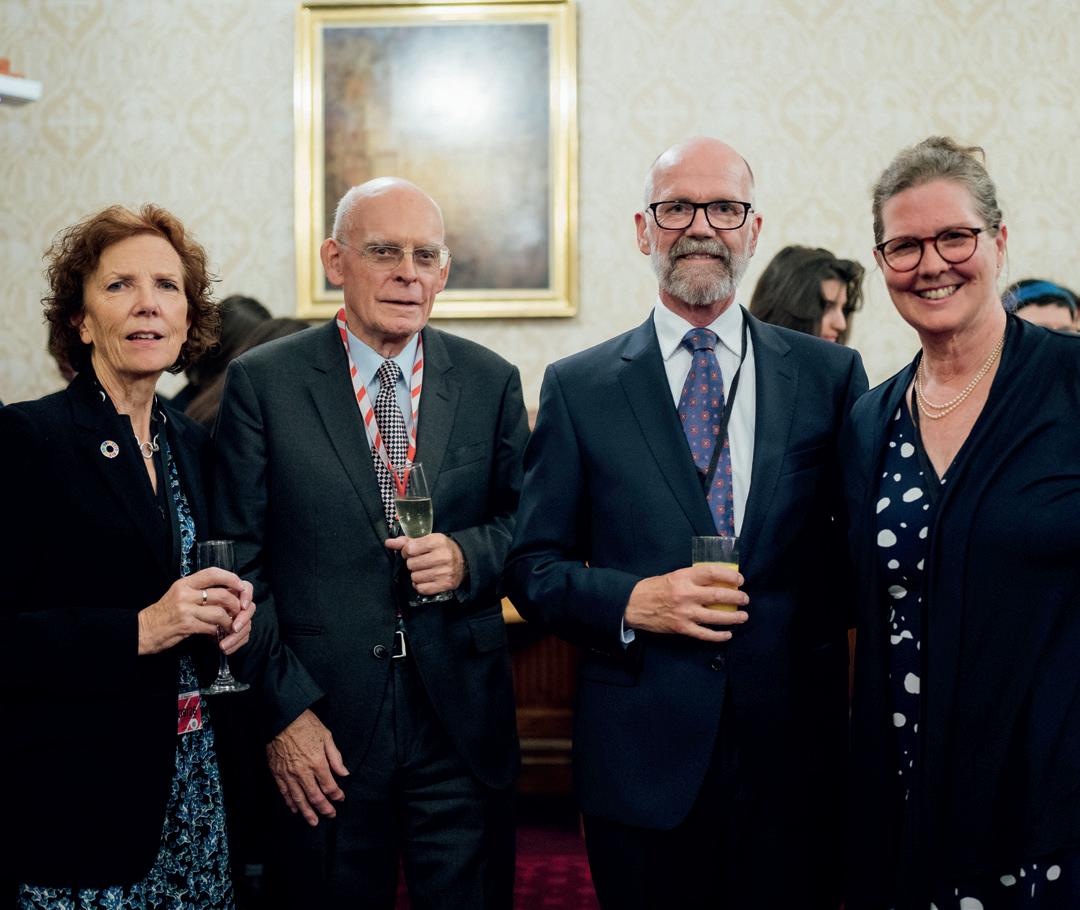
 DPhil Physiology, Anatomy & Genetics
DPhil Physiology, Anatomy & Genetics
I am a first year DPhil student in the Wade-Martins research group, the Laboratory of Molecular Neurodegeneration. I grew up in Hong Kong, to which my mother and father immigrated from the Philippines and UK, respectively. Always fascinated by the rapidly developing field of neuroscience, I completed my undergraduate degree in that field at the University of Leeds, then worked as a research assistant in the WadeMartins research group for two years. I am tremendously excited to start my DPhil project. My research will revolve around understanding the genetic risk factors of Parkinson’s disease, combining the approaches of image-based cell profiling and proteomics in a CRISPRbased genetic screen using stem-cell derived neurons. Outside my research I enjoy baking and reading Modern Japanese literature. I am extremely grateful to be chosen as a Thatcher Scholar, and I hope to be able to contribute to the wider academic field and reveal therapeutic opportunities to benefit patients.
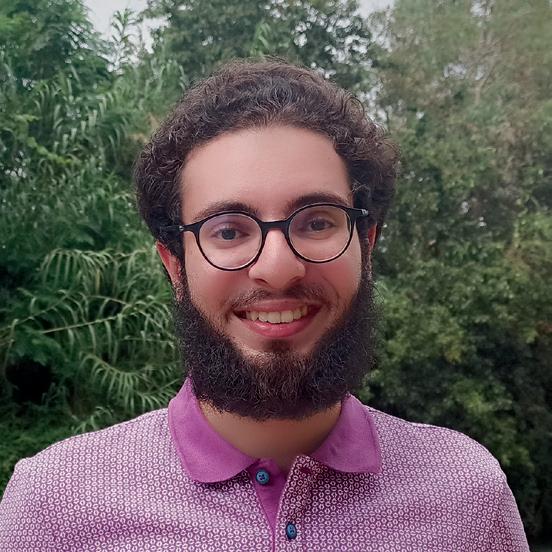 Oxford Qatar Thatcher Scholar DPhil Engineering
Oxford Qatar Thatcher Scholar DPhil Engineering
I come from Saida, Lebanon, a small city on the east coast of the Mediterranean. I received a full scholarship to study at the American University of Beirut (AUB) after being ranked third across Lebanon in the official baccalaureate exams. There I gained my Bachelor of Engineering degree in Mechanical Engineering, ranked 1st with high distinction, alongside a minor degree in Arabic and Near Eastern Languages. During my time at AUB, I participated in departmental research work and I also worked with the Insight Club AUB to create a supportive community for university students where they could balance physical, intellectual and spiritual needs. I am interested in the field of solid mechanics and mechanics of composite materials. I have carried out research related to mechanics of round geometries and contact mechanics, failure of dendritic chains in rechargeable batteries and recycling and mechanical characterisation of carbon fibre reinforced polymers. I aim to apply my experience to Metal Organic Framework Materials (MOFs), studying their mechanical properties and their composites in polymer matrices and different geometries. Beyond engineering, I retain my interest in languages and I also enjoy reading folk literature and walking.
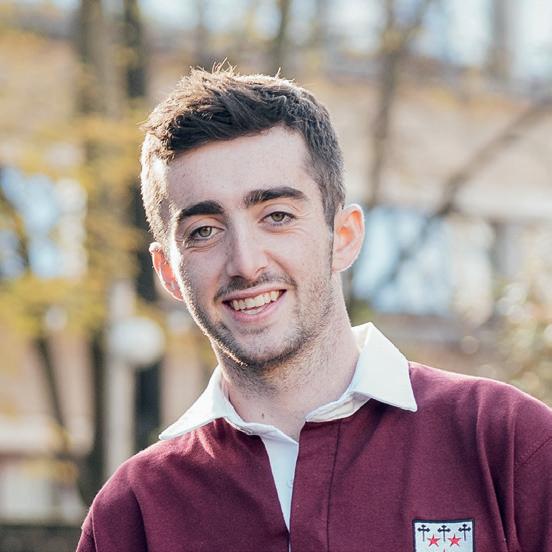
Oxford Margaret Thatcher Scholar DPhil Engineering
I am originally from Sheffield, where I attended my local state school. From there, I moved to Bristol and pursued a degree in Mechanical Engineering, ultimately graduating in 2023 with a Master’s and the Bechtel Industrial Individual Prize. During my time at Bristol, I had the opportunity to engage in various cross-disciplinary research projects. I designed cooling pipes for nuclear fusion reactors using computational fluid-dynamic modelling, conducted experiments with 3D printers to develop cost-effective methodologies for microfluidic devices and created analogue models to measure ground deformation in volcanic regions. These projects allowed me to specialise in fluid dynamic modelling, all of which I’m taking forward in my PhD. Specifically, my research involves modelling the fluid dynamic interaction within offshore wind and tidal turbine clusters. The aim is to enhance the realism of computational models and gain insights into the optimal cluster arrangements that maximise energy production efficiency. Outside my academic pursuits, I am an avid runner and climber. I also enjoy playing the French Horn and have the privilege of participating in multiple orchestras.
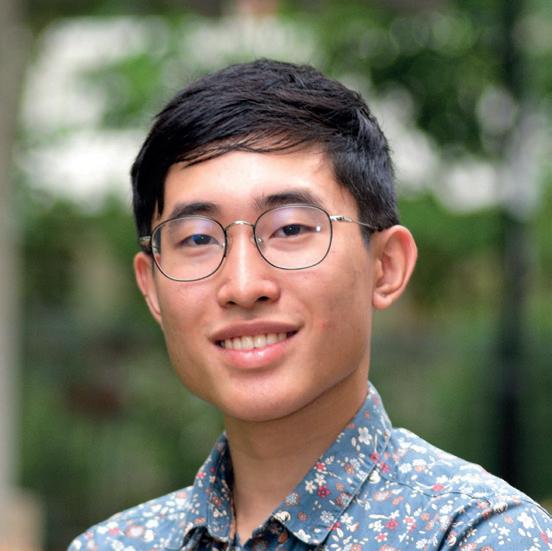
I come from Singapore and I have been fascinated by physics since I was young. I was initially captivated by the marvels of astronomy, before gradually learning to love all facets of the subject. Physics’ explanatory and predictive powers have done so much for humanity, and continue to hold promise for addressing the problems we face today. I hope to use the first few years of my degree to explore my interests in greater detail, with an eye towards potentially studying atmospheric and oceanic physics, so as to help in the fight against climate change. My time here thus far has been wonderful, with the friendliness of my peers and the diversity of the student body putting me at ease almost from the moment I arrived. I look forward to continuing my interests in photography and birdwatching here, as well as exploring the various clubs and societies in Oxford – I might pick up a sport or two! I am so, so grateful for the opportunity afforded to me by the Lee Kuan Yew–Thatcher Scholarship. It’s a great honour, and I will make the most of my time here to grow and develop as a person and a physicist.
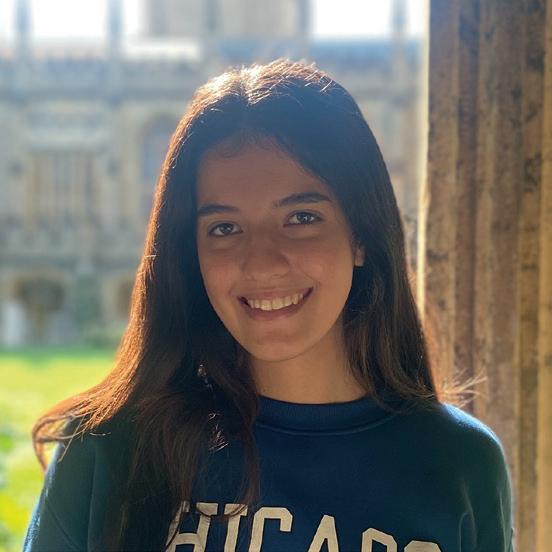
Oxford Qatar Thatcher Scholar
MSc Advanced Computer Science
I was born in Damascus, Syria, where I spent the first half of my life. When I was 10, I moved to Beirut, Lebanon, where I was fortunate to be awarded a scholarship to study Computer Science at the country’s most prestigious university. My academic interests revolve around complexity theory and the mathematical foundations of AI. My non-academic interests, however, are broader as I enjoy playing badminton, swimming, and reading about politics, philosophy, and economics. Having the chance to study Computer Science at one of the world’s leading universities will greatly serve my career as a researcher. Therefore, I am truly grateful to the MTST for providing me with this opportunity.
Sawsan El-Zahr (2022, DPhil Engineering) has developed a Carbon-Aware Traffic Engineering system for a greener internet that won both the 2024 Applied Networking Research Prize and the 2024 STEM for Britain Dyson Sustainability Prize. Read more, p14.
Caitlin Kelly (2020, BA English, Ann and Giles Currie Thatcher Scholar) was awarded a Gibbs Prize for distinguished performance in the Final Honour School and the Cecily Clark studentship to support her MSt in English at Magdalen College.
Althea Sovani (2018, BA Classics and Oriental Studies, Qatar Thatcher Scholar) won the Gaisford Prize for Greek Prose and the Chancellor’s Latin Verse Prize, and is applying for PhDs in Oxford and the USA.
Salma Daoudi (2021, DPhil International Relations, Oxford Qatar Thatcher Scholar) interviewed Syrian refugees about their experiences of health insecurity as visiting researcher at the Royal Scientific Institute, Jordan, and Issam Fares Institute for Public Policy, Lebanon, thereby facilitating a multi-disciplinary collaboration on the intersection between conflict, climate change and human security.
Joe Salf (2017, Medicine, Michael Bishop Foundation Thatcher Scholar) achieved a distinction in clinical medicine and is now a junior doctor in Dundee. His project evaluating palliative
Osamah Sufyan (2020 MSt Mathematical and Theoretical Physics) is studying for a PhD in Computational Quantum Physics at the Max Planck Institute for Structure and Dynamics. He has created a YouTube channel for science outreach in Arabic, including advice on applying to universities such as Oxford. The account now has 8,000 subscribers, 250,000 views and is still growing!
Will Sargent (2015 Graduate Entry Medicine) is an Army doctor who continues his research in, and has published articles on, conflict injury.
Mathew Madain (2019 MSc Modern Middle Eastern Studies) has just completed a fellowship with the Carnegie endowment focusing on Palestine. He recently founded Scholars Speak: The Global
care services for patients who die in the Emergency Department has been submitted to the Royal College of Emergency Medicine.
George Seager (2020, BA Classics, Michael Bishop Foundation Thatcher Scholar) was part of Somerville’s Ashmolean Ambassador Programme and worked at the Corinium Museum in Cirencester before joining a threeweek archaeological dig in Thessaly over the summer.
Isaac Tay (2021, BA PPE, Lee Kuan Yew – Thatcher Scholar) was JCR Internationals Officer and undertook an internship at Oyika, a Singaporean start-up in the Electric Vehicle industry.
Holly Cobain (2021, BA Modern Languages, Michael Bishop Foundation Thatcher Scholar) spent her year abroad in Estonia before teaching English to refugees in Germany.
Ming Song Oh (2022, BA Law, Lee Kuan Yew – Thatcher Scholar) was elected JCR Sports Officer, led Somerville’s primary school twinning programme and secured two internships with Singaporean law firms.
The following Thatcher scholars completed their DPhils in 2022/23: (1) Ed Brewer (2019, DPhil Physical and Theoretical Chemistry, Oxford Margaret Thatcher Scholar); (2) Mai-Britt Wiechmann (2018, DPhil Medieval and Modern Languages, Oxford Thatcher Scholar); (3) Federico Trinca (2019, DPhil Mathematics, Oxford Thatcher Scholar); (4) Martin Fellermeyer (2018, DPhil Medical Sciences, Oxford Thatcher Scholar).
Collegium for Peace, a new organisation to empower the voice of scholars in policy-making and peacemaking on the global stage (see feature p10).
Achraf Brahim (2022 MSt Late Antique and Byzantine Studies) is now undertaking doctoral studies at the University of Vienna.
Sean Butler (2017 BCL Law) is a barrister with Blackstone Chambers. Prior to going to the Bar, Sean taught contract law at UCL and was Judicial Assistant to the Master of the Rolls in the Court of Appeal (2018-19), where he assisted the court with deciding a number of significant cases.
Luca Webb (2019, History) is now Head of Communications at SmartParc, an SME ‘reimagining food production for the 21st Century’.
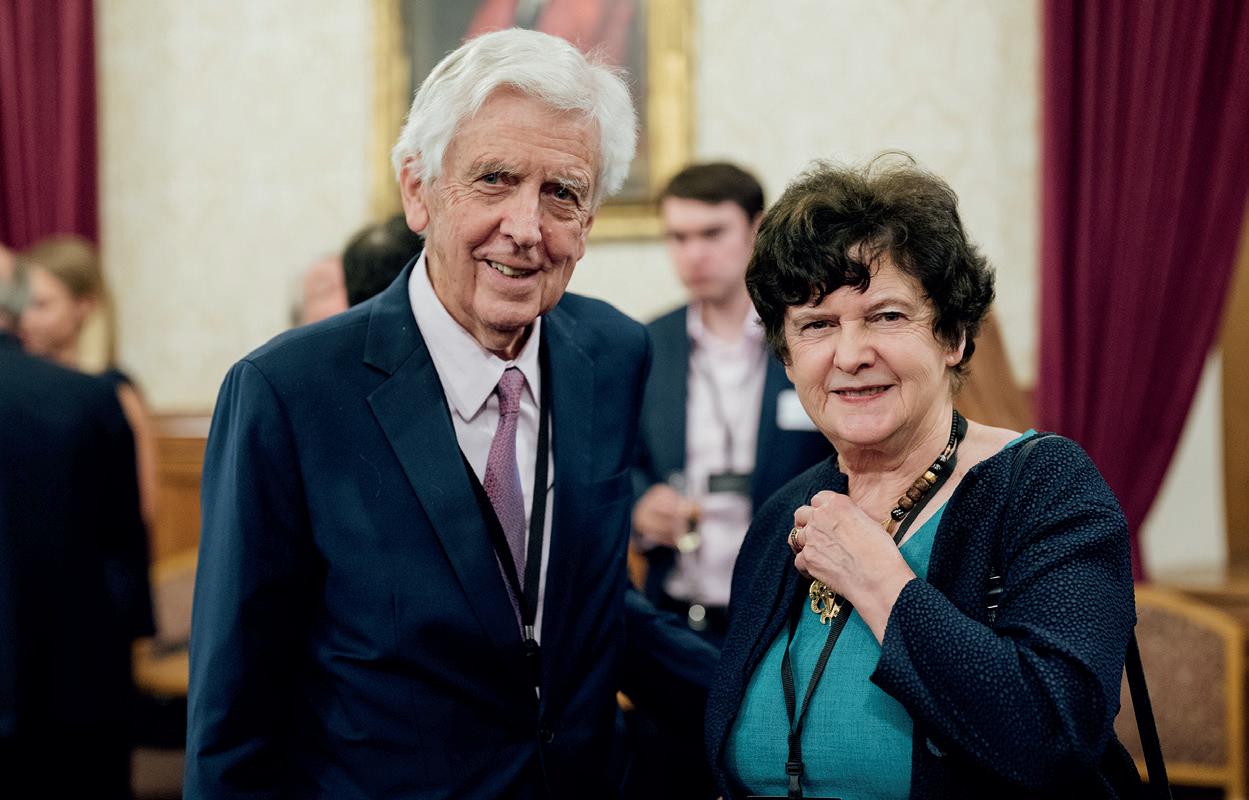
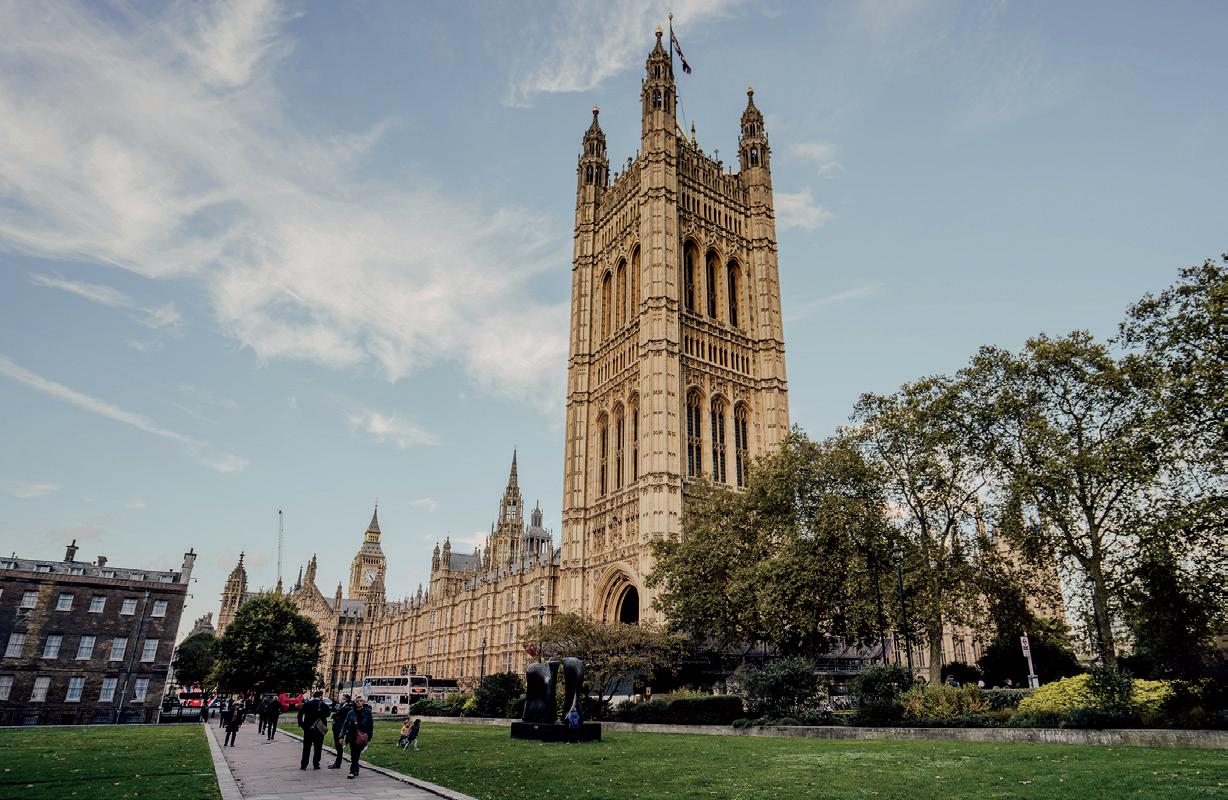
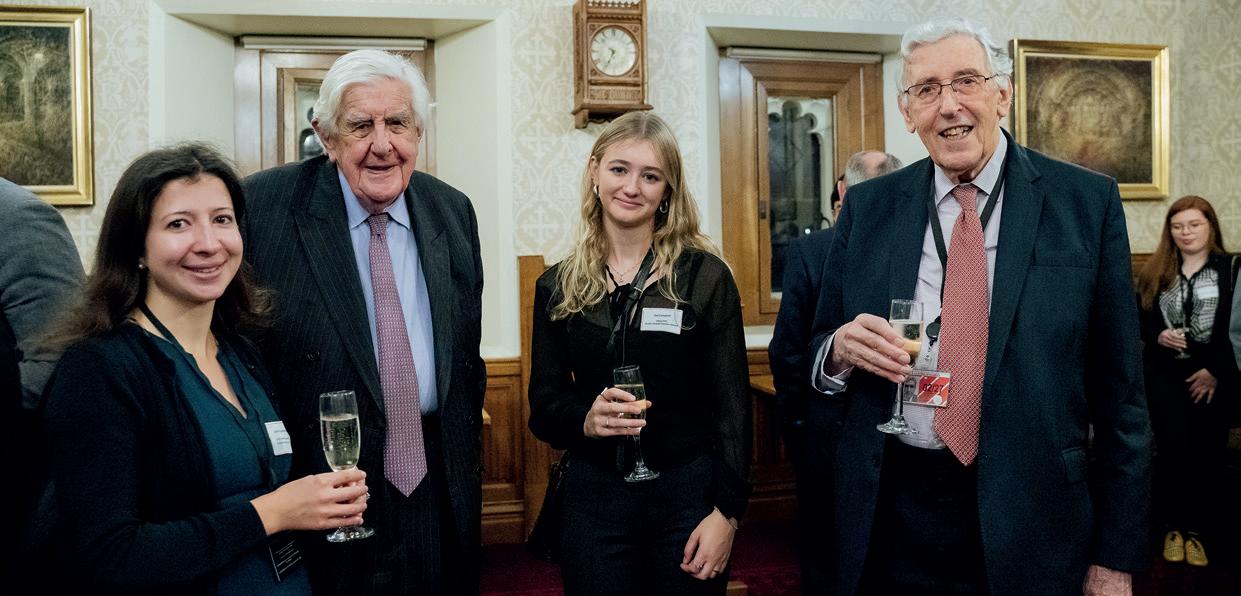
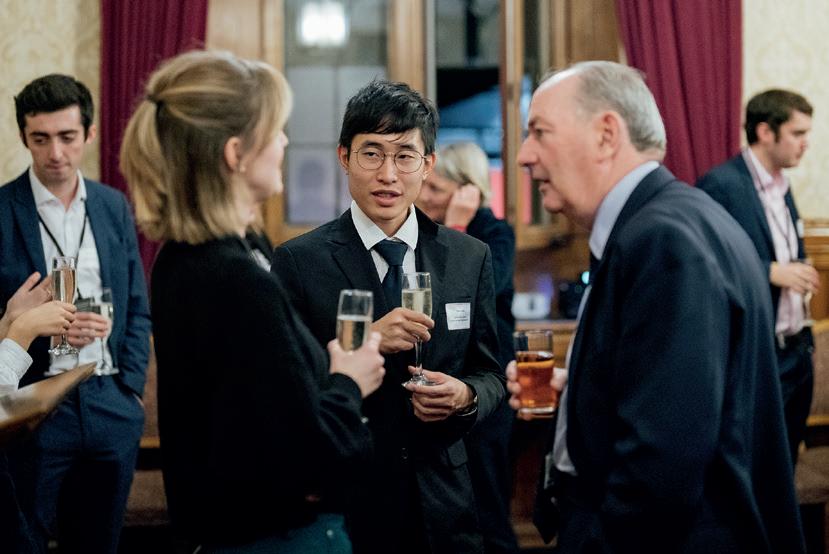
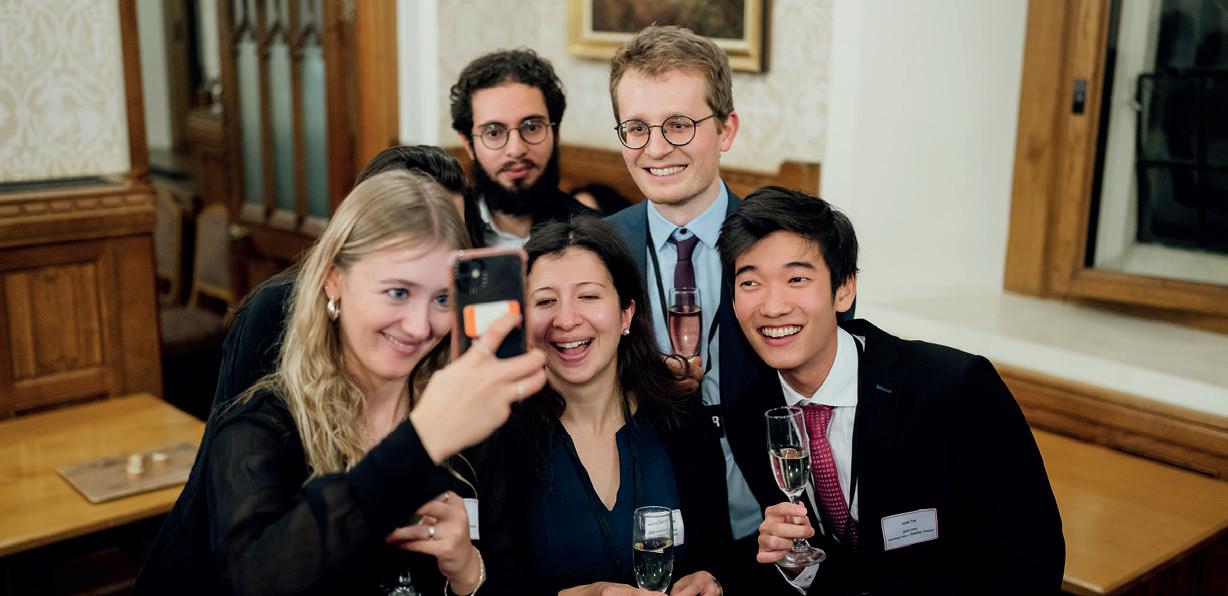
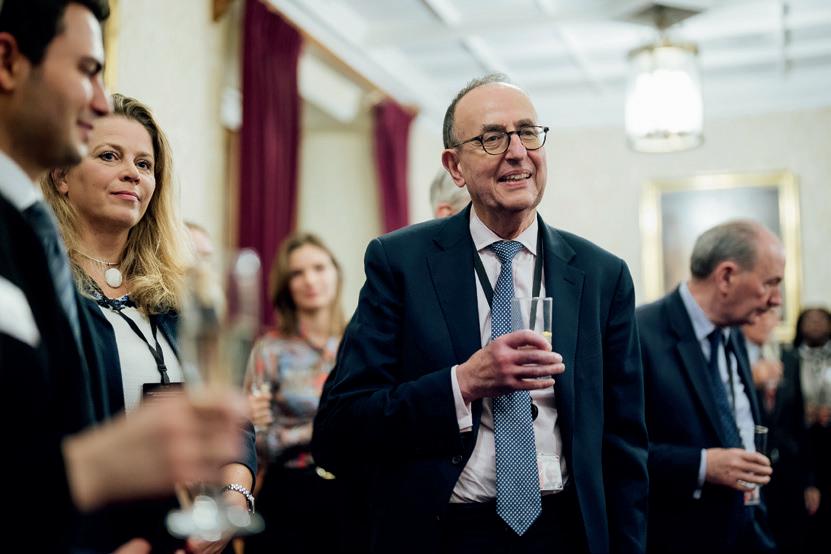
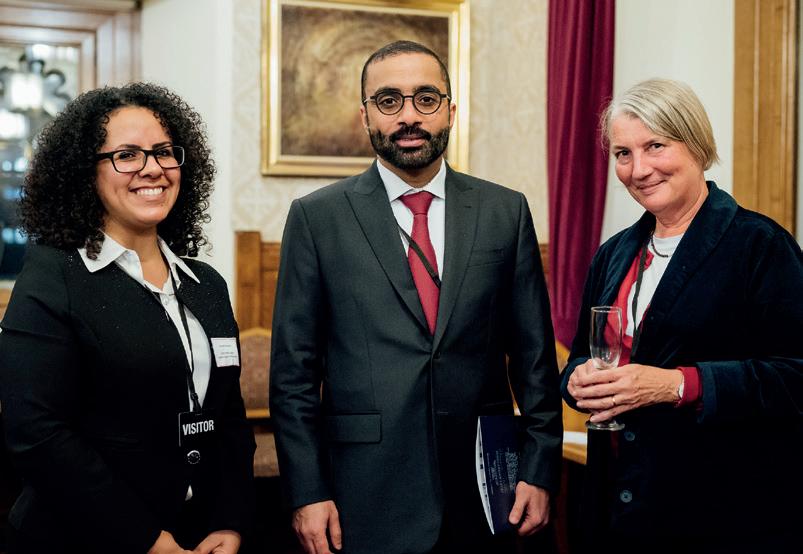
The sun shone as we gathered in the Attlee Room in the House of Lords to celebrate 10 years since the founding of the Margaret Thatcher Scholarship Trust. This was a wonderful opportunity for our Trustees, donors and Patrons to meet the Thatcher Scholars, and for the scholars to meet and thank those who have supported them.
We were honoured to be joined by former colleagues of Margaret Thatcher, including two members of her first cabinet in 1979, the Lords Jopling and Howell. The Principal gave a short address before introducing Mathew Madain (2019, MSc Oriental Studies, Oxford Qatar Thatcher Scholar), who spoke movingly about the power of the Trust’s vision. Lord Powell, whose energy and commitment have been crucial from the very start, then spoke about how proud Lady Thatcher would be of the scholars who bear her name. She could be no more proud than we are of these extraordinary young people.
“THE RECOGNITION OF OUR SHARED HUMANITY”: PIONEERS, PEACE AND PUBLIC SERVICE
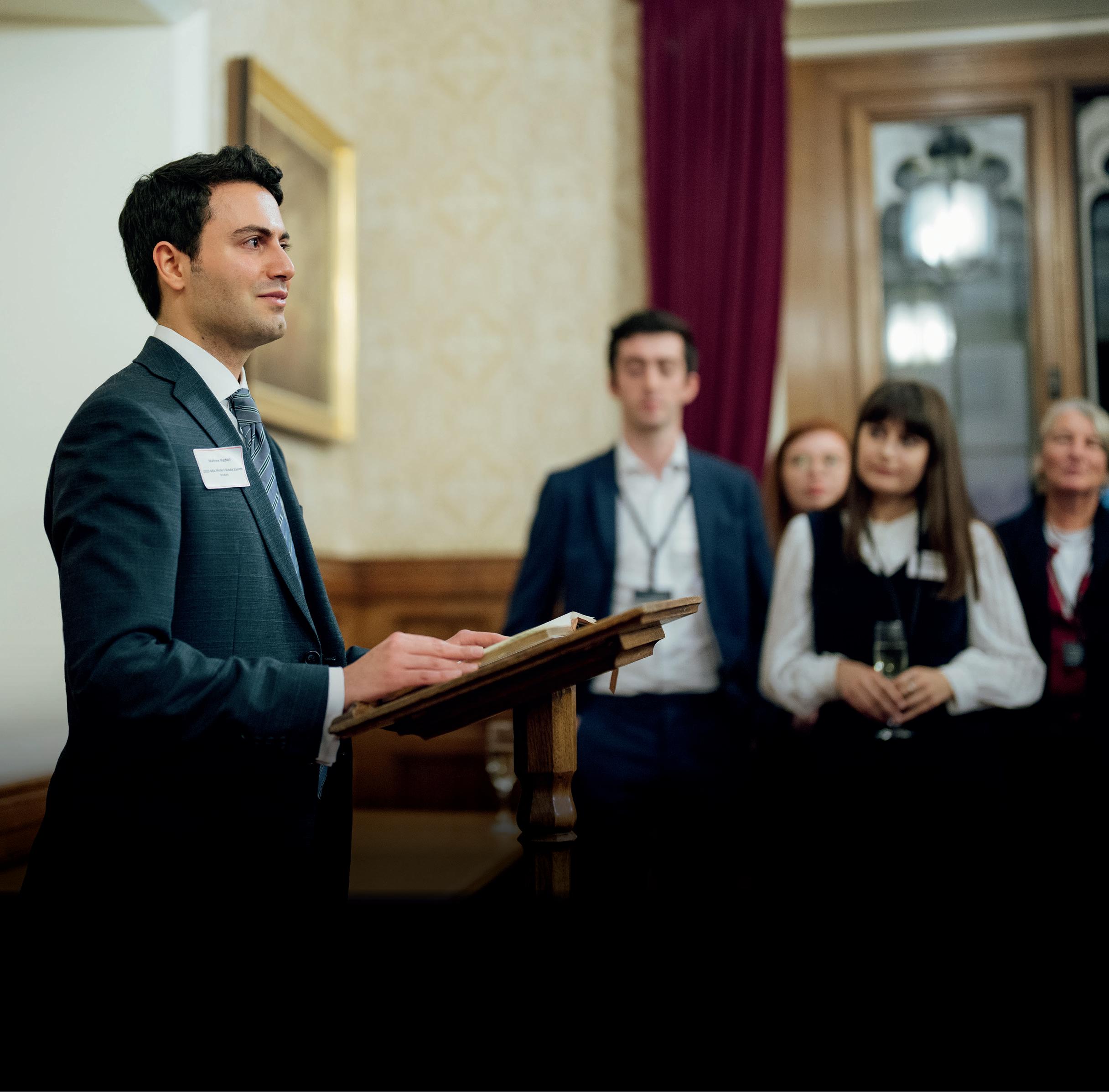
After leaving Oxford, Mathew Madain (2019, MSc Modern Middle Eastern Studies, Oxford Qatar Thatcher Scholar) worked as a research assistant in the Middle East Program at the Carnegie Endowment for International Peace. He has recently founded Scholars Speak: The Global Collegium for Peace and Security. His work aims to bridge the world of academia and decision-makers, bringing the voices of scholars to the global stage. Joining us at our reception in the House of Lords on 24 October 2023 to celebrate our 10th anniversary, Mathew took time to reflect on the role of the Thatcher Scholarships in shaping a better world.
“My Lords, my Ladies, fellow Somervillians and distinguished friends, good evening.
It is with great honour that I appear before you today on this memorable commemoration of the founding of the Margaret Thatcher Scholarship Trust, representing the recipients of this distinguished
award. On behalf of Thatcher Scholars – past and present – I relay profound thanks to the Trustees and Patrons of this Trust. The awards given through the Margaret Thatcher Scholarship Trust have forever transformed the lives and the careers of awardees, many of whom have come to Oxford from faraway places.
I come from Washington bearing admiration at the strength of our transatlantic partnership and the enduring Anglo-American alliance which was strengthened under Lady Thatcher’s distinguished tenure. It is a partnership which continues to reflect the best of our peoples and the enduring potential of Brits and Americans to join hand-in-hand in promoting peace and security across the globe. My Lords, Ladies, and distinguished friends, I speak on behalf of a cohort of stellar achievement, among whom stand future ministers, Nobel laureates, and prize-winning authors. The trajectory of each Thatcher Scholar was shaped at Somerville College through cutting-edge study and the support and mentorship of the Directors and Trustees of the Margaret Thatcher Scholarship Trust. On behalf of the scholars present, I wish to thank Somerville College Principals, Dr Alice Prochaska and the Rt. Hon. Baroness Royall for their vision which has sustained the vibrancy of this Trust. I join in echoing resounding thanks to Jessica Mannix, Claire Cockroft and Sara Kalim for their unwavering dedication to the success of our scholars.
My Lords, Ladies, and venerable scholars, I address you at a moment of unprecedented challenge to global peace and security. Conflicts which have their epicentre in distant regions reverberate at home in
profound ways. We are unable to ignore the suffering of Ukrainians, or the cries of anguish of the children of Gaza, as well as the victims of violence in Israel. At this time of extraordinary global suffering, calls for peace resound. But, as the effects of conflict are not bound by borders or seas, momentum for peace must also begin here – at home.
Now, the question arises: where can peace be found?
Peace is not simply the absence of violence, nor is it guaranteed through armistices and ceasefires. It begins within. It is in the recognition of our shared humanity and the desire of each of us to live securely and in freedom. Peace is not solely within the purview of policymakers, but of scholars, scientists, of artists, too, each working with talents with the betterment of humanity in mind.
“Let us be known as peacemakers.”
My fellow scholars, over our lifetimes we will carry many titles. But first among them, let us be known as peacemakers.”
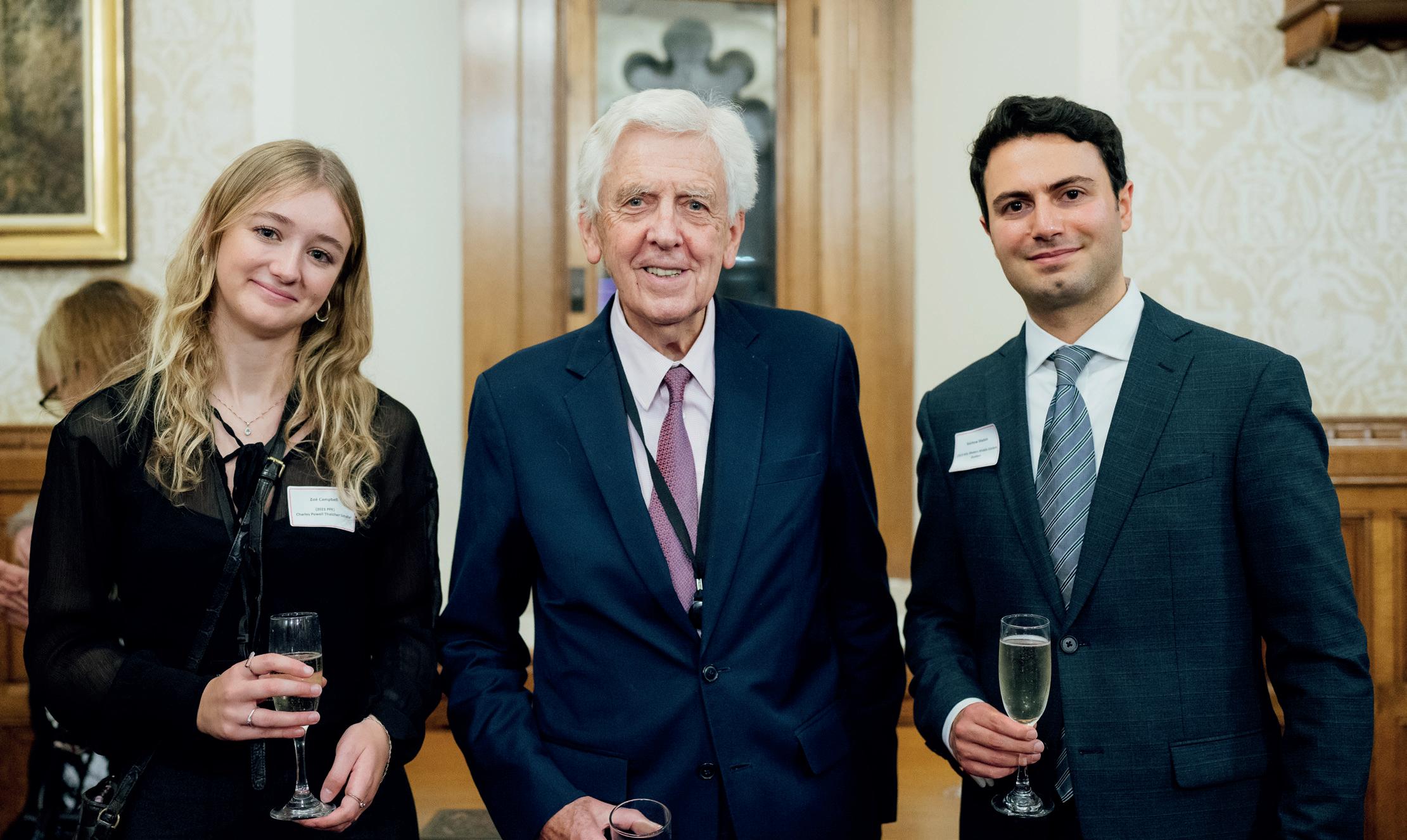
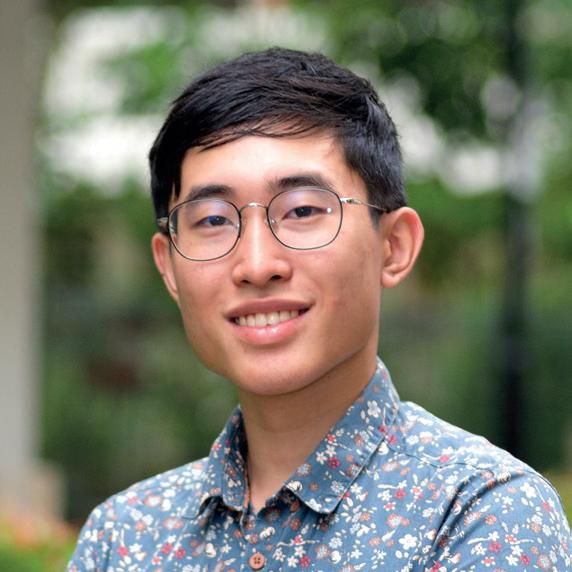
In 2013, the Margaret Thatcher Scholarship Trust was established to create a living legacy to one of Somerville’s most eminent alumnae. It pledged to bring the brightest minds to Somerville and empower them in forging a better future for their generation and those that follow. Ten years later, Milton Lee (2023, Physics) has reached the historic milestone of becoming the 50th Thatcher Scholar – a journey which he recounts for us here.
My family’s financial future was wholly derailed in 2005. Our savings, which had been invested into a joint venture, were siphoned out by a business partner. An enterprise which should have provided for our future became a $200,000 black hole, triggering a legal battle that took five years to resolve. Squeezed by solicitors’ fees, even the school bus became an expense my parents had to plan around. Luxuries were out of the question. All this –plus the insecurity of not knowing if it would be made right – led to a lot of tension during my childhood.
It was against this stressful backdrop that I went through school. Instead of resorting to private tuition whenever my grades flagged (extremely common in Singapore for those aspiring to university), I fell in love with learning on my own terms. I discovered the fascinating possibilities of maths through YouTube videos, and lost myself in Wikipedia rabbit holes on astronomy. I learned from my peers, too, persuading the Seniors at my
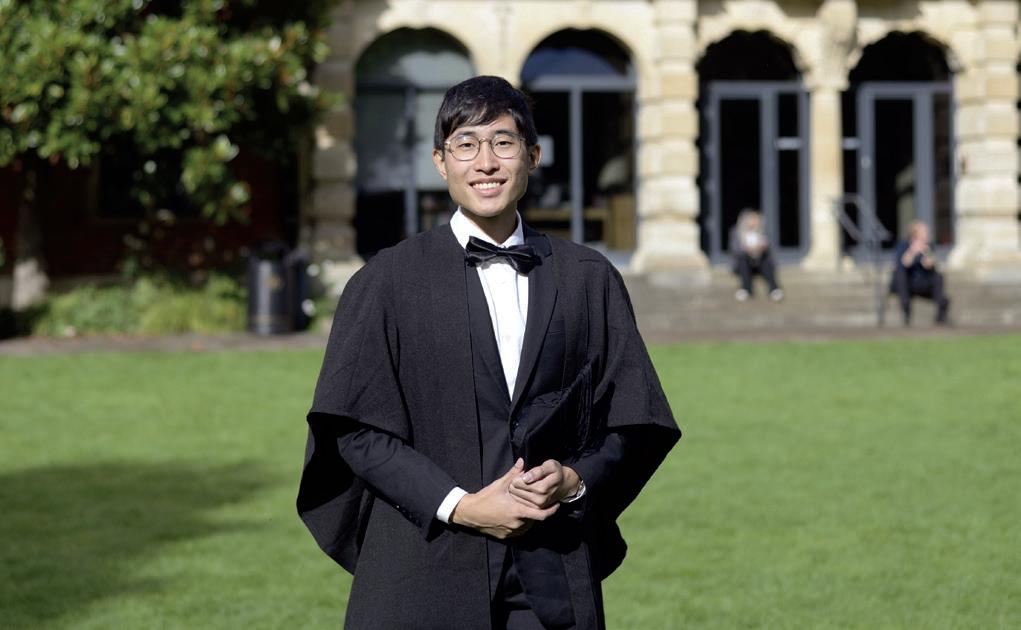
college to teach me calculus so I could pull my weight in astronomy competitions. I was also lucky to receive academic support from many wonderful and dedicated teachers.
My passion for learning drew me inexorably towards Oxford. I applied in 2020 and received an offer to study Physics at Jesus College. My joy at winning a place was soon tempered by the reality of tuition fees. Government scholarships for Physics degrees are few and far between, and getting a huge private loan is something I can ill-afford, as I will soon need to support my parents in their retirement.
Discovering the Lee Kuan Yew-Thatcher Scholarship changed things; it was a simple choice to decline my offer and re-apply for Somerville to chase the glimmer of hope it represented. Preparing for admissions tests and interviews at the same time as military service was physically and mentally gruelling. I had to make the best use of every scrap of time and energy available to me (even sneaking in revision during military exercises). The life of being an Oxford student seemed very distant.
But then the news arrived. It is hard to describe the jubilation I felt when I learned that my efforts had paid off and some fortune had finally come our way. I am so grateful to ST Telemedia and the Margaret Thatcher Scholarship Trust for giving me this opportunity and making it possible for me to study at Somerville – this scholarship has rekindled my hopes and dreams. With it, I aim to contribute towards the fight against climate change to the best of my ability.

We are delighted to announce that our Governing Body have elected the businessman and philanthropist Lord Glendonbrook CBE AM, to a Foundation Fellowship, our highest recognition for benefactors of the College.
His generous support for the Margaret Thatcher Scholarship Trust has been transformative, with the first Michael Bishop Foundation Thatcher Scholarship being one of the two inaugural Thatcher Scholarships awarded in 2016. There have been a further seven Michael Bishop Foundation Thatcher Scholars in the years since. He has taken an active role in meeting his scholars and getting to know them, as well as hosting them at his home, Bruern Abbey.
Asked about the scholars and his continued patronage, Lord Glendonbrook said: “It’s always a pleasure to support these scholars, and never less than inspiring to meet them personally.”
“I am honoured and proud to present Lord Glendonbrook, a wonderful friend and supporter, with a Foundation Fellowship of Somerville College,” said Jan Royall at an informal presentation ceremony hosted at her home and attended by some of the current Michael Bishop Foundation Thatcher Scholars.
“Michael’s support of the Margaret Thatcher Scholarship Trust was fundamental in enabling us to begin awarding undergraduate Thatcher scholarships in 2016, three years after the Trust was established.
“His commitment to helping outstanding and deserving scholars will benefit them for the rest of their lives - indeed, it will transform their lives. Such lasting change is a fitting tribute to his long-standing friendship with, and admiration for, Lady Thatcher.”
Lord Glendonbrook’s business career has been in the airline industry. He rose to become CEO of British Midland in 1969 and then became Chairman in 1978 after leading a management buyout. Under his leadership, the company became the second largest airline in the UK.
In addition to his business interests, Lord Glendonbrook was Chairman of Channel 4 from 1993-1997. He established the Michael Bishop Foundation in 1987 and the Glendonbrook Foundation in Sydney in 2007. He was made CBE in 1986, knighted in 1991 and made a life peer in 2011. In 2023 he was appointed Member of the Order of Australia in recognition of his philanthropy.
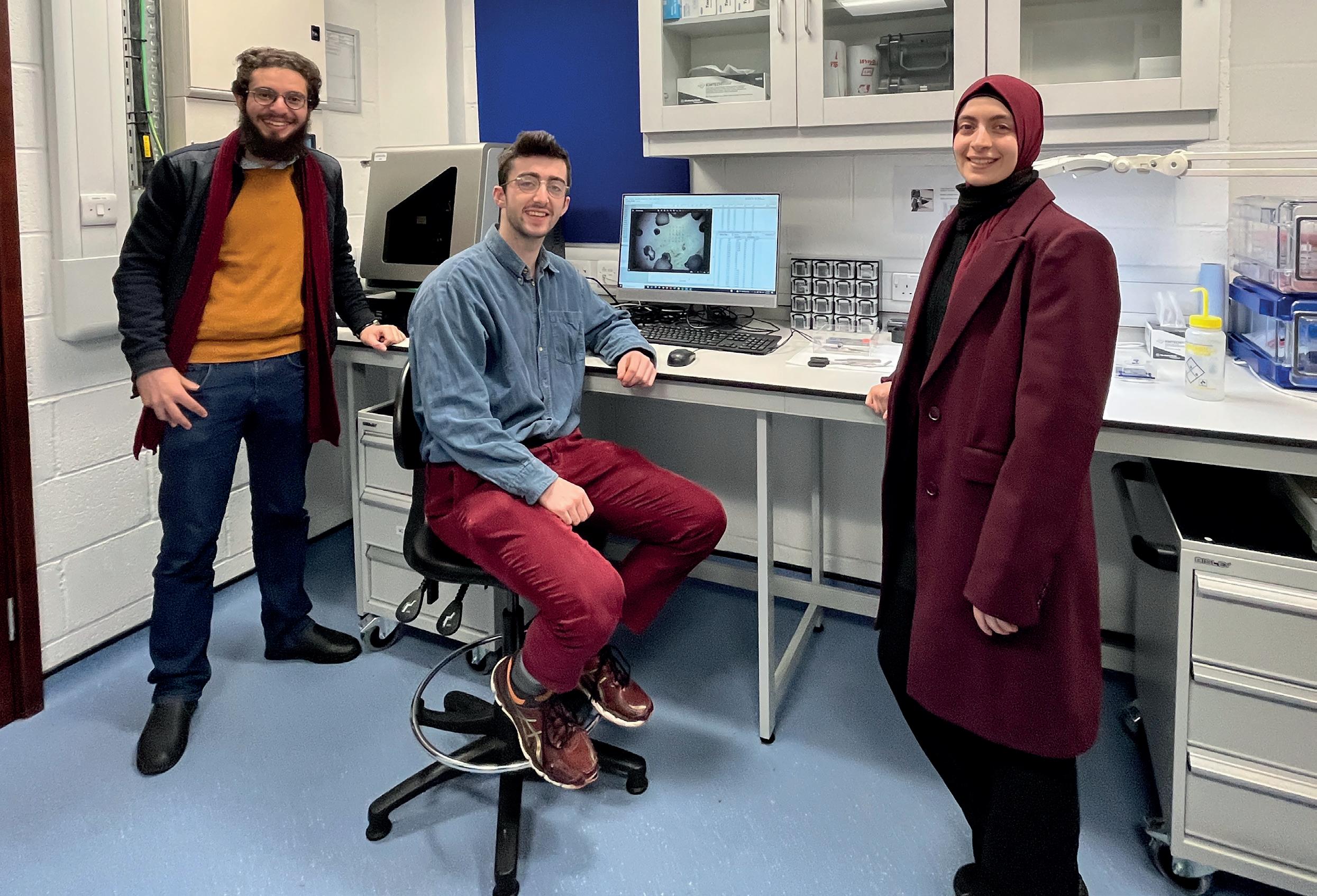
From wind turbines through network infrastructure to new carbon-capture methods, the work of our Thatcher Scholar doctoral engineering candidates showcases the breadth of the discipline and its crucial importance in addressing the climate crisis. Here, Sawsan El-Zahr, Mounir El Skafi and Timothy Rafferty give us three very different windows onto the engineering of a net-zero future.
Reducing the carbon emissions of the Internet is an important goal, and there are many challenges that Internet Service Providers (ISP) will need to face as we move towards net-zero networks.
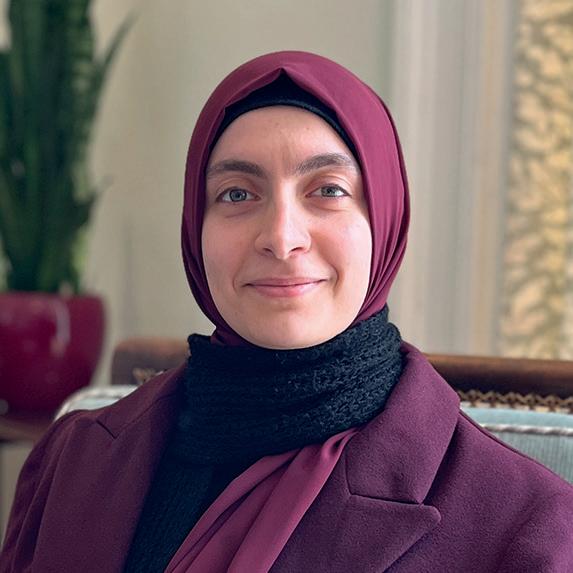
As we rely more on the Internet to do online conferencing, online gaming and the use of AI, the carbon footprint of the Internet is increasing.
My work zeroes in on carbon emissions of computer networks, rather than energy consumption alone, and my research combines routing algorithms, power modelling, and net-zero solutions. This approach has enabled us to define a new set of energy- and carbon-related metrics to assess the carbon
reduction benefits of different solutions. The resulting Carbon-Aware Traffic Engineering Solution can shutdown under-utilised links in a given network, achieving significant energy reductions without endangering overall resilience.
With the help of my supervisor Professor Noa Zilberman and a collaboration with British Telecom (BT), I recently published my first results. My work was recognised by the Internet Research Task Force (IRTF) as some of the most exciting new research in the field and received the Applied Networking Research Prize (ANRP). I was subsequently invited to enter my work at the 2024 STEM for Britain Competition in the House of Lords. I am thrilled to confirm that there, on March 4 2024, I was awarded first prize in the Dyson Sustainability Award. I hope these wonderful achievements are just the beginning of my research in sustainable networking. I also remember with gratitude that this research would not be possible without the support I have received here at Oxford and especially at Somerville.
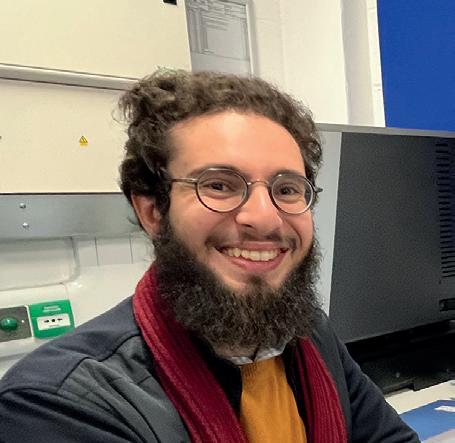
Novel materials created by scientists around the world can open up new worlds of engineering possibilities – but only if we can harness and control them. That’s where mechanics engineers like me come in. We take these resources from the lab bench to the field, where they can be manufactured, processed, and deployed all over the world in ways those who discovered them may never have envisaged.
My research involves one such class of materials called metal-organic frameworks (MOFs). These materials consist of metal atoms connected to organic compounds that act as “linkers” which we produce as millimetre-scale monoliths. These monoliths are rigid and brittle, but they have a highly porous internal structure that makes them good candidates for many promising applications.
The legendary Nobel Prize winning physicist Werner Heisenberg is reputed to have said that, if he were ever to come face-to face with God and be allowed to ask Him two questions, they would be: “Why quantum mechanics? And why turbulence?” Supposedly, he was only certain that God would be able to answer the first question. The central mathematics of fluid dynamics, the NavierStokes equations, still remain stubbornly resistant to a solution. (If you’ve got any ideas, the Clay Mathematics Institute are offering $1 million for the correct answer!)
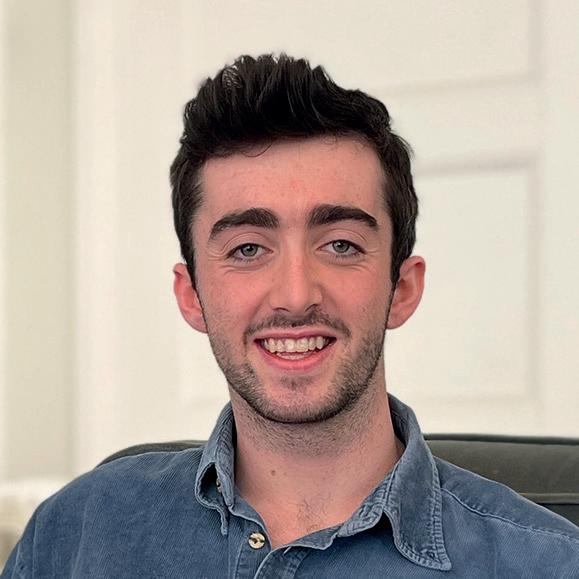
The combination of metal atoms and organic linkers gives metal-organic frameworks some intriguing properties. They are particularly good at absorbing gases and they can behave in different and interesting ways if subjected to high and low pressure. They are therefore an enticing possibility for a variety of applications, most notably as a material for gas storage and separation and sensing applications.
However, these materials are highly brittle and subject to fracture, limiting their practical use and their large-scale production so far. In my PhD, I aim to further our understanding of the mechanics of MOF monoliths and the factors that contribute to their strength and stiffness, and to produce monoliths at larger scales and with different shapes and architecture geometries. The cycle of testing, adjusting and testing again will, we hope, allow us to converge upon the physical truths of the material, taking MOFs from conjecture to real-life applications that will shape future technology.
My research focuses on how we can use computer modelling to see and understand the turbulence generated by the interaction between the air and wind turbine blades. There are a number of factors to balance for accurate modelling. For example, many approaches so far have assumed a laminar, steady, uniform wind inflow to the turbines. In reality, wind turbines sit in the atmospheric Boundary layer (ABL) where wind is turbulent, with the roughness
of the terrain below affecting velocity at height and fluctuations in air temperature. The blades themselves also generate turbulence. The job of a computational fluid dynamics engineer like me is to try to incorporate these phenomena into modelling.
Right now, I am working on a particularly intriguing aspect. Gravity waves have only been recently shown to be induced by offshore wind farms and can significantly impact their performance.
I hope that, ultimately, my work can help enable the creation and operation of wind farms that generate as much energy as possible, as efficiently as possible. Ideally, we would create a simple analytical solution that could be run many times a day on the ground, allowing wind farms to adjust and optimise their operation to differing atmospheric conditions in real time. A huge challenge - yet worthwhile!
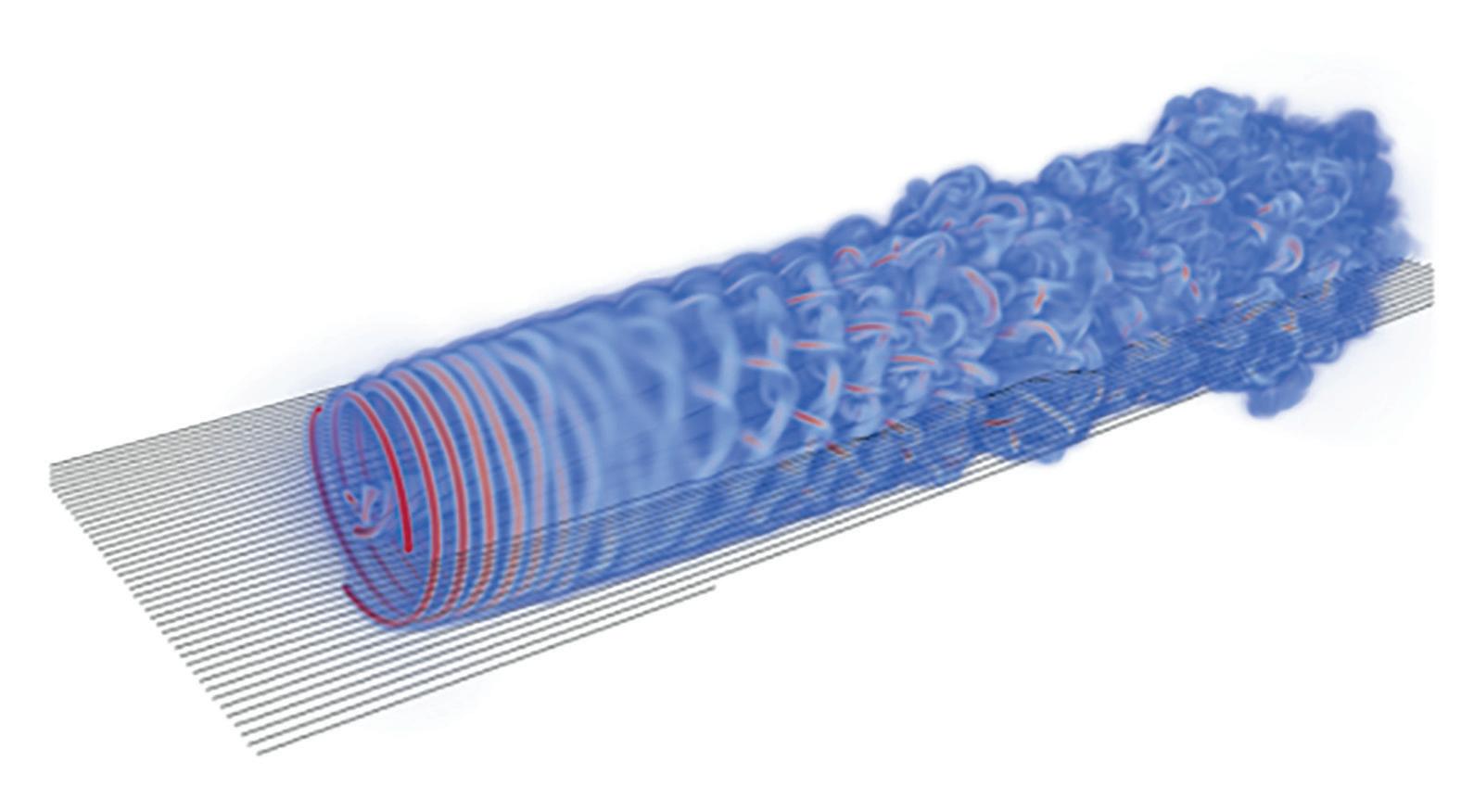
The Rt Hon. the Baroness Royall of Blaisdon, Chair of Trustees ex officio
Professor Daniel Anthony
Mrs Clara Freeman OBE
Mr Andrew Parker ex officio
Lord Sherbourne of Didsbury
Professor Almut Suerbaum
Professor Stephen Weatherill
The Rt Hon. Sir Tony Blair
The Rt Hon. the Lord Forsyth of Drumlean
The Hon. Dr Robert Gates
The Hon. Dr Alan Greenspan
Ho Ching
The Hon. John Howard
The Rt Hon. Sir John Major
The Rt Hon. the Lord Owen
The Rt Hon. the Lord Patten of Barnes
The Lord Powell of Bayswater
The Hon. Dr Condoleezza Rice